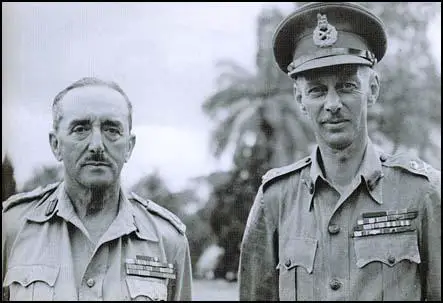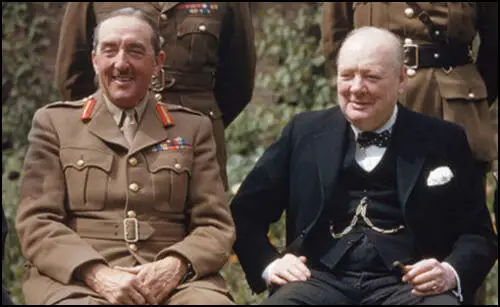Alan Brooke, Baron Alanbrooke of Brookeborough
Alan Brooke, the son of the wealthy Victor Brooke of Ulster, was born in Bagnères-de-Bigorre on 23rd July, 1883. After graduating from the Royal Military Academy at Woolwich on 24 December 1902 Brooke was commissioned into the Royal Regiment of Artillery as a Second Lieutenant.
Brooke served in Ireland and India before the outbreak of the First World War in 1914. He served on the Western Frontwith the Royal Artillery. It has been claimed that during the Battle of the Somme in 1916 he introduced the idea of the creeping barrage system. An expert on artillery tactics, Brooke was mentioned six times in dispatches and became chief artillery officer in the 1st British Army.
In 1923 Brooke was promoted to colonel and lectured at Camberley Military College and the Imperial Defense College. He served with Bernard Montgomery who later commented: " I had, and retain, a great liking and an enormous admiration and respect for him. I consider he is the best soldier that any nation had produced for very many years." In 1937 Brooke was given the command of Britain's first mobile division and the following year he was promoted to the rank of lieutenant general and became head of the Territorial Anti-Aircraft Corps.
In August 1939 Brooke was appointed head of Southern Command and on the outbreak of the Second World War went to France as a member of the British Expeditionary Force under General John Gort. In June 1940 Brooke played a leading role in the evacuation of British troops at Dunkirk. General Brian Horrocks argued in his autobiography, A Full Life (1960): "The more I have studied this campaign the clearer it becomes that the man who really saved the B.E.F. was our own corps commander, Lieutenant-General A. F. Brooke. I felt vaguely at the time that this alert, seemingly iron, man without a nerve in his body, whom I met from time to time at 3rd Division headquarters and who gave out his orders in short, clipped sentences, was a great soldier, but it is only now that I realise fully just how great he was. We regarded him as a highly efficient military machine. It is only since I have read his diaries that I appreciate what a consummate actor he must have been. Behind the confident mask was the sensitive nature of a man who hated war."

Brooke returned to Britain and in July 1940 he replaced Edmund Ironside as commander of the Home Forces. In this post Brooke had several major disagreements with Winston Churchill about military strategy. It therefore came as a surprise when Churchill appointed him Chief of Imperial Staff in December 1941. General Harold Alexander believed it was a good appointment: "Brookie, as we always call him, was the outstanding and obvious man for the job; a fine soldier in every sense, and trusted and admired by the whole Army."
Although the two men continued to disagree about a large number of issues, for example, Brooke favoured an early invasion of Europe on order to take pressure off the Red Army on the Eastern Front, he gradually became Churchill's most important military adviser in the war.

Brooke was offered command of the British troops in the Middle East in August 1942 but turned it down suggesting General Harold Alexander for the post. In his diary Brooke recorded that it was more important for him to remain in Britain in order to stop Winston Churchill making any major military mistakes. He wrote in his diary: "We had to consider this morning one of Winston's worst minutes I have ever seen. I can only believe that he must have been quite tight when he dictated it. My God! How little the world at large knows what his failings and defects are!"
Churchill had promised Brooke command of Operation Overlord in 1944. However, President Franklin D. Roosevelt insisted that General Dwight Eisenhower should be given this important task. Promoted to field marshal in January 1944 he was created Baron Alanbrooke of Brookeborough in September 1945. After retiring from the British Army he was a director of Midland Bank.
Alan Brooke died on 17th June 1963.
Primary Sources
(1) Bernard Montgomery, The Memoirs of Field Marshal Montgomery (1958)
My Corps Commander (in France in 1939) was General Brooke. We had been instructors together at the Staff College and I knew him well. I had, and retain, a great liking and an enormous admiration and respect for him. I consider he is the best soldier that any nation had produced for very many years.
(2) As commander of a machine-gun battalion, Brian Horrocks served under Alan Brooke during the German Western Offensive. He later wrote about Brooke in his autobiography A Full Life (1960)
The more I have studied this campaign the clearer it becomes that the man who really saved the B.E.F. was our own corps commander, Lieutenant-General A. F. Brooke (now Viscount Alanbrooke). I felt vaguely at the time that this alert, seemingly iron, man without a nerve in his body, whom I met from time to time at 3rd Division headquarters and who gave out his orders in short, clipped sentences, was a great soldier, but it is only now that I realise fully just how great he was. We regarded him as a highly efficient military machine. It is only since I have read his diaries that I appreciate what a consummate actor he must have been. Behind the confident mask was the sensitive nature of a man who hated war.
(3) Winston Churchill, The Second World War (1950)
It seemed possible that the German Air Force could very rapidly be made to shift its weight back from the East to the West. At any rate, we must be ready for such a sudden change. Sir Alan Brooke, Commander-in-Chief of the Home Forces, was responsible for representing this vital need. He was quite right to set forth the claims of Home Defence, and this was certainly done by him and his powerful staff in a most vigorous fashion. He demanded large numbers of men, and confronted us with grisly reductions of fighting units if these were not forthcoming. It fell on me as Minister of Defence with the Chief of Staff to decide the true apportionment of our already heavily strained man-power and woman-power.
(4) Harold Alexander, Memoirs: 1940-1945 (1961)
General Sir Alan Brooke (now Field-Marshal Lord Alanbrooke) succeeded General Sir John Dill as Chief of the Imperial General Staff in December 1941. In his appointment the Prime Minister made a wise choice. I served under him as a commander in the field most of the war and I could not have had a wiser, firmer, or more understanding military chief to guide and look after our interests.
Brookie, as we always call him, was the outstanding and obvious man for the job; a fine soldier in every sense, and trusted and admired by the whole Army. He had proved himself a capable commander of a corps in the early days of the war, and had been a senior instructor at the Staff College before the war; he was therefore well equipped to shoulder the responsibilities of his high appointment.
(5) General Alan Brooke, Chief of Imperial General Staff (diary entry, 6th August 1942)
One of the most difficult days of my life. I had been offered the finest command I could ever hope for and I turned it down. It would take at least six months for any successor, taking over from me, to become as familiar with Churchill and his ways. During these six months anything might happen.
(6) General Alan Brooke, Chief of Imperial General Staff (diary entry, 12th April 1945)
We had to consider this morning one of Winston's worst minutes I have ever seen. I can only believe that he must have been quite tight when he dictated it. My God! How little the world at large knows what his failings and defects are!

